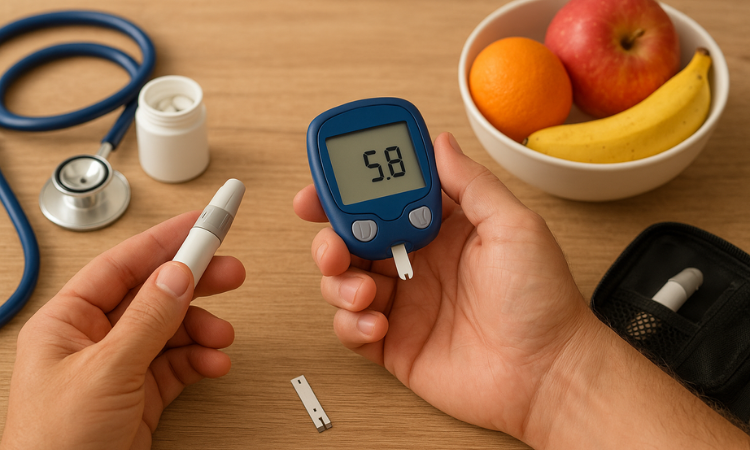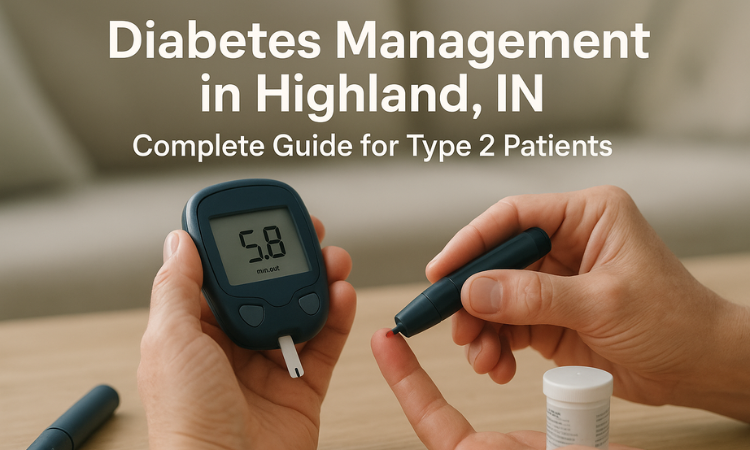Managing Type 2 diabetes requires consistent care, regular monitoring, and the right medical support. In Highland, IN, many individuals rely on primary care clinics to understand their symptoms, track their progress, and maintain long-term health. Effective diabetes management focuses on lifestyle changes, medical treatment, and early detection of complications. When patients work closely with a trusted primary care physician, they stay in better control of their blood sugar and prevent serious health issues.
Understanding Type 2 Diabetes
Type 2 diabetes develops when the body becomes resistant to insulin or doesn’t produce enough of it. As a result, blood sugar levels remain consistently high. Many patients in Highland experience symptoms such as fatigue, frequent urination, blurred vision, increased thirst, and slow healing wounds. Early diagnosis and ongoing management are essential because uncontrolled diabetes increases the risk of heart disease, kidney damage, neuropathy, and vision problems.
A primary care doctor plays a central role in diagnosing and managing Type 2 diabetes. Through routine examinations, blood work, and personalized treatment plans, patients receive a clear understanding of their condition and the steps they need to take to manage it.
The Role of Primary Care in Diabetes Management
A primary care physician serves as the first point of contact for individuals managing diabetes. They monitor blood sugar levels, adjust medications, provide lifestyle counseling, and identify early signs of complications. Patients benefit from a consistent care approach because diabetes requires long-term attention and continuous evaluation.
Primary care doctors also coordinate care with specialists when needed. If a patient develops kidney concerns or nerve-related symptoms, the physician may refer them to nephrologists or endocrinologists while still managing day-to-day diabetes care. This coordinated approach strengthens Diabetes Management in Highland IN by ensuring patients receive comprehensive support for every stage of their condition.
Creating a Personalized Diabetes Treatment Plan
Every patient has a different lifestyle, health history, and set of challenges. That’s why a personalized treatment plan is important for effective diabetes management. A typical plan includes:
1. Medication Management
Primary care doctors help patients understand how diabetes medications work and when to take them. They adjust dosages based on blood sugar levels, side effects, and patient progress. Many individuals start with oral medications, while others may need insulin or combination therapies depending on their condition.
2. Blood Sugar Monitoring
Monitoring is one of the most important steps in diabetes care. Patients learn how often they should check their levels and what their target ranges should be. Regular tracking helps identify patterns and prevents dangerous spikes or drops.
3. Lifestyle and Nutrition Support
Healthy eating plays a major role in controlling Type 2 diabetes. Primary care clinics often guide patients on choosing foods that stabilize blood sugar, such as whole grains, lean proteins, vegetables, and low-glycemic fruits. Physicians also encourage portion control, meal timing, and limiting processed sugars.
4. Exercise Recommendations
Regular physical activity allows the body to use insulin more effectively. A primary care doctor typically suggests moderate exercises such as walking, cycling, or light strength training. Even 30 minutes of activity most days of the week can significantly improve blood sugar levels.
5. Routine Screenings
Patients with diabetes require regular screenings for blood pressure, cholesterol, kidney function, and foot health. These screenings help detect early complications and ensure timely treatment.
To understand how ongoing support affects long-term health, you can also read Why Choosing the Right Primary Care Physician in Highland Is Essential for Preventive Health

Preventing Diabetes-Related Complications
Managing Type 2 diabetes effectively helps prevent long-term health problems. Common complications include neuropathy (nerve damage), nephropathy (kidney issues), retinopathy (eye damage), and increased risk of heart disease. Regular checkups allow doctors to catch these concerns early and manage them before they become serious.
Patients should schedule annual eye exams, monitor their feet for wounds, and check their blood pressure regularly. A primary care physician works closely with patients to keep every part of their health on track.
Why Local Care Matters in Highland, IN
Receiving consistent diabetes care from a local primary care clinic provides convenience and continuity. Patients can schedule regular visits, keep up with monitoring, and get quick help when their blood sugar changes unexpectedly. A trusted provider understands each patient’s medical history and lifestyle, which makes treatment more effective, especially for those looking for reliable diabetes management in Highland IN.
Living in Highland means access to reliable medical support right within the community. Patients do not need to travel far or wait long for appointments, which helps them stay more committed to their health routines.
Tips for Managing Type 2 Diabetes Daily
Patients can improve their health by following simple daily habits:
- Track blood sugar as recommended.
- Choose balanced meals and reduce sugary snacks.
- Stay hydrated throughout the day.
- Take medications consistently.
- Stay active through walking, stretching, or household activities.
- Get 7–8 hours of sleep each night.
- Attend follow-up appointments with their primary care doctor.
These steps may seem small, but they create long-term improvements when followed consistently.
Final Thoughts
Type 2 diabetes is manageable with the right care, consistent follow-ups, and healthy lifestyle choices. Patients in Highland, IN, benefit greatly from working closely with a primary care physician who provides guidance, monitors progress, and helps prevent complications. With personalized treatment plans and ongoing support, individuals can maintain stable blood sugar levels and protect their long-term health.








